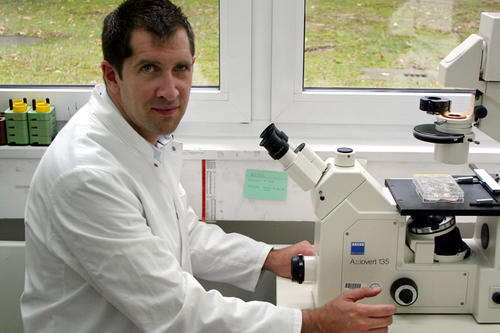Artificial Skin as an Alternative to Animal Testing
Pharmacology professor Günther Weindl of Freie Universität Berlin has received two awards for his research.
Oct 04, 2013
Professor Günther Weindl is striving to find alternatives to animal testing.
Image Credit: Thomas Rostek
It is supposed to respond to drugs and help reduce animal testing – artificial skin created in a lab. Pharmacology professor Günther Weindl and his working group at the Institute of Pharmacy at Freie Universität Berlin are working on developing skin models as the basis for drug tests, thereby simulating inflammatory skin diseases.
In the long term, their aim is to reduce animal testing in pharmacy. Weindl has now received a research award from the State of Berlin for his efforts.
“I am pleased that there is an interest in supporting research that is free of animal testing even outside the university,” says Weindl. It shows, he says, that the goals of scientific work to find alternatives to animal testing are also supported by society at large.
Weindl and his group are working to develop “immunocompetent” models of the skin – artificial models that react to contact with pharmacological agents. To this end, researchers have injected human immune cells called Langerhans cells into the artificial skin as it grows in a Petri dish.
The goal is to simulate allergic reactions such as those experienced by human subjects who cannot tolerate certain medications, only using artificially generated skin. Weindl and his colleagues also hope to arrive at more detailed findings on how skin cells and immune cells interact.
Research on Alternative Methods Has Been Insufficient to Date
After studying pharmacy at Ludwig-Maximilians-Universität (LMU), in Munich, Weindl completed a one-year internship in preclinical research in Japan, where he was confronted with many animal trials. Weindl says this sparked his interest in specializing in an area of research that uses methods other than animal testing after he returned to Germany, “even though pharmacology is actually a classic example of a discipline that does use animal testing,” he says.
At LMU Munich, he started working in molecular mycology research before accepting an opportunity to move to Freie Universität Berlin. “Animal testing will still be necessary in the future,” Weindl says. “But it’s important for the tests to be used sensibly, and for alternative methods to be developed,” he adds. After all, there is certainly a need to fill.
Starting in March 2013, the EU has prohibited animal testing to determine the tolerability of cosmetic ingredients. In pharmaceutical trials, on the other hand, drugs can still be tested on animals to determine whether they can be tolerated. And that is exactly where Weindl’s work comes in: researching alternative methods that could reduce unnecessary pain during animal trials in the future.
For his work, he has received not only the 15,000-euro “Research Award of the State of Berlin to Promote Research on Alternative Methods and Methods to Supplement Animal Testing in Both Scientific Research and Teaching,” but also an additional award from the animal protection organization, Bündnis Tierschutzpolitik Berlin.
“We’ve made a lot of progress in the past few months.”
Weindl and his team are confident that the further results of their research will go well, and that it will be possible to observe reactions in the skin model that mirror those seen in real human skin. “We haven’t yet reached the point where our skin models can differentiate between sensitizing and non-sensitizing substances. The tests for that will get under way in the next few weeks,” he says.
Sensitizing chemicals include dyes and metal alloys containing elements such as nickel or chromium, which can trigger allergies in people. In the field of pharmacy, there are plans to test substances such as anesthetics, analgesics, and antibiotics that cause adverse reactions in some patients.
Although the team has not yet reached all its goals, Weindl is convinced that his research is on the right track. Berlin’s senator for consumer protection, Thomas Heilmann, who presented the award to Weindl, agrees. “We will never be able to completely abolish animal testing, but Professor Weindl’s work shows us ways to reduce the number of tests. That means we are one step closer to becoming the capital of alternative methods.”
Further Information
Prof. Dr. Günther Weindl, Freie Universität Berlin, Department of Biology, Chemistry, and Pharmacy, Institute of Pharmacy, Email: Guenther.Weindl@fu-berlin.de

